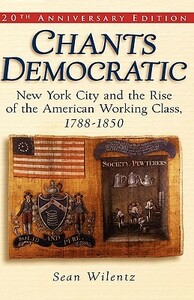Take a photo of a barcode or cover
1 review for:
Chants Democratic: New York City and the Rise of the American Working Class, 1788-1850
Sean Wilentz
1 review for:
Chants Democratic: New York City and the Rise of the American Working Class, 1788-1850
Sean Wilentz
I always struggle with labor history, and this work is no exception. I had a really hard time with it, navigating the individuals, the strikes, the different industries, and so on. For me, it gets worse as time goes on with countless acronyms for unions, etc. Yet, this book had a different draw than most other labor histories I've read, to the point where it seems to be an American "echo" of [b:The Making of the English Working Class|947848|The Making of the English Working Class|E.P. Thompson|https://i.gr-assets.com/images/S/compressed.photo.goodreads.com/books/1543364405l/947848._SY75_.jpg|932773]. In his work, Wilentz pushes back against two earlier generations that thought about transformations in New York during the years at hand. The first, progressive, generation argued that the transformation of New York was a result of party politics, especially as they related to the industrial revolution and Jacksonian democracy, which combined brought about the "proletariat." The second, counter-progressive, generation argued instead that Democrats and Whigs had far more commonalities than differences in terms of both ideology and and composition. Yet, they had had much in common with progressives.
Wilentz is a representative of the third generation, which pushed back against both progressives and counter-progressives. Both groups had reified class concepts, framing them as something static and perpetually in conflict with one another. Wilentz, on the other hand, comes at it from the perspective that class is a dynamic social relation that constantly shifts in relation to changing systems of production (as well as the larger culture in which it exists). There is some degree of class conflict in this book, but it's not the whole story. Instead, this book is about the collapse of artisanal craftsmen and its replacement by capitalist entrepreneurship during industrialization.
By "industrialization," Wilentz does not mean "mechanization" but "capitalization." The social relations of labor transformed as New York began to trade more heavily with other parts of the Atlantic and wage labor was introduced. The shifting patterns of labor forced a transformation in definitions of republicanism. To Wilentz and, presumably, his subjects, republicanism is defined by five interlocking concepts:
- Commonwealth: Desire to preserve the common good
- Virtue: Subordinating private aims to public good
- Independence: Separation of political wills to avoid corruption and influence
- Citizenship: Political action to resist tyrants
- Equality: All citizens should have natural civil and political rights (not usually shared by the wealthiest, nor by white Americans toward African Americans)
As the way artisans saw their economic circumstances shift, the way they relied on these republican concepts also transformed, producing a fundamentally "working class" ideology and way of life.
There's way more than could be said in this review, and it's easy to get lost in the details, but this is how I see Wilentz's argument shaking out. It's a good, and important one, but damn was this a slog for me.
Wilentz is a representative of the third generation, which pushed back against both progressives and counter-progressives. Both groups had reified class concepts, framing them as something static and perpetually in conflict with one another. Wilentz, on the other hand, comes at it from the perspective that class is a dynamic social relation that constantly shifts in relation to changing systems of production (as well as the larger culture in which it exists). There is some degree of class conflict in this book, but it's not the whole story. Instead, this book is about the collapse of artisanal craftsmen and its replacement by capitalist entrepreneurship during industrialization.
By "industrialization," Wilentz does not mean "mechanization" but "capitalization." The social relations of labor transformed as New York began to trade more heavily with other parts of the Atlantic and wage labor was introduced. The shifting patterns of labor forced a transformation in definitions of republicanism. To Wilentz and, presumably, his subjects, republicanism is defined by five interlocking concepts:
- Commonwealth: Desire to preserve the common good
- Virtue: Subordinating private aims to public good
- Independence: Separation of political wills to avoid corruption and influence
- Citizenship: Political action to resist tyrants
- Equality: All citizens should have natural civil and political rights (not usually shared by the wealthiest, nor by white Americans toward African Americans)
As the way artisans saw their economic circumstances shift, the way they relied on these republican concepts also transformed, producing a fundamentally "working class" ideology and way of life.
There's way more than could be said in this review, and it's easy to get lost in the details, but this is how I see Wilentz's argument shaking out. It's a good, and important one, but damn was this a slog for me.

